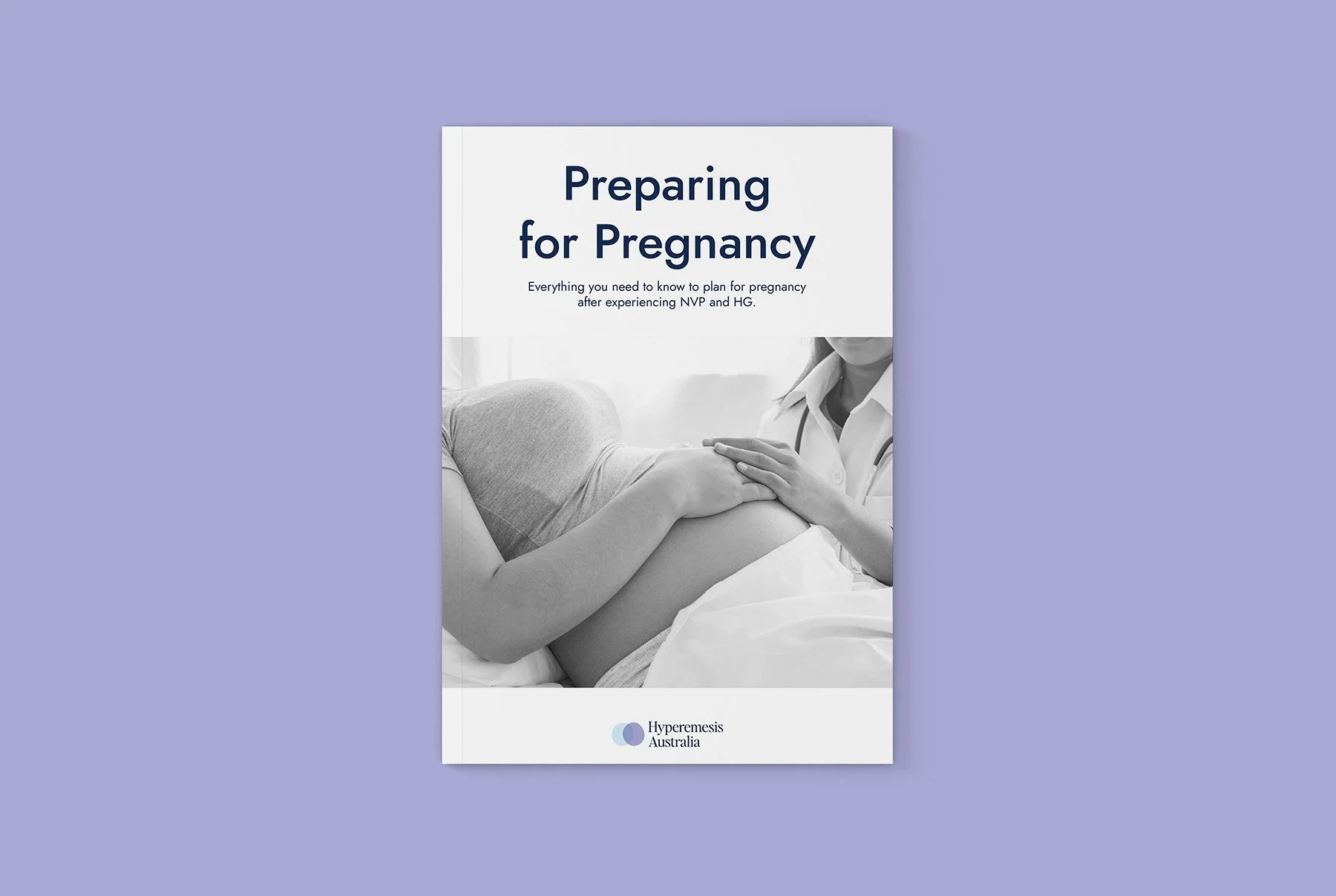Preparing for a HG pregnancy
This resource has been prepared for you to take along to your GP or OB so that you can work together on your care plan. You should include anything from your previous experiences that may be helpful this time.
Whether you suffer from HG or NVP in your first or fifth pregnancy there is a high chance of developing the condition again in your next pregnancy. Now that you know what to expect, it’s important to have a solid care plan in place before you start trying to conceive, or as soon as you find out you’re pregnant.
Hopefully, this plan will not be necessary and you may not experience pregnancy sickness to the same extent as last time. But it doesn’t hurt to be as prepared as possible, especially if you do develop symptoms. Knowing that your plan is laid out and agreed on by all involved will limit how stressful pregnancy sickness can be.
Once you’ve finalised your care plan make sure that everyone who needs a copy has one, and be sure to have a version with you at all times in case you need to share it with a new doctor, nurse or midwife (this might be a printed version in your handbag or a digital copy on your phone.)
How in-depth the plan needs to be will partly depend on how severe your condition was last time. For example, if you were admitted repeatedly for IV fluids throughout your previous pregnancy or were unable to take some medications then your care plan needs to take those things into account.
Our guide with everything you need to know to plan for pregnancy after experiencing NVP and HG, including:
What to document in advance
Managing the condition
Things to plan with your GP
Tracking your symptoms
Printable Sickness in Pregnancy Plan
Planning for a HG Pregnancy
HG MANAGEMENT PLAN
-
At what point you should start initial treatment and at what level of sickness you would consider a need to increase treatment i.e. vomiting more than 5 times a day? Weight loss of 5% or more of pre-pregnancy weight? Not managing to drink 500ml or more of fluid per day? Other criteria? It may help to ask yourself what level of sickness would render you unable to live your life as ‘normally’ as you would if you weren’t pregnant
-
What criteria will you be admitted to hospital for? If there is a choice of hospitals in your area do you have a preferred one, is there a particular consultant you would like to be under? If you need to be admitted what will the procedure be for that? i.e. avoiding having to go via ED as that can prove distressing. Can your GP/OB arrange for you to go straight to the ward?
-
Is there the option for IV fluids as a day patient? Is the option of home IV available in your area? Is the doctor happy for you to monitor fluid intake/output at home and then to discuss treatment on the phone so as to avoid difficult trips to the surgery which can exacerbate symptoms and distress? Are home visits available and if deemed necessary what is the best arrangement for the surgery to make this possible
-
Which other adults do you give permission to discuss your condition with the doctor? This could be your partner, a parent, trusted friend or colleague?
-
Do you need a referral for mental health support? Many sufferers experience anxiety and depression during NVP and HG due to the intense and debilitating nature of the condition. It is worth considering if you might benefit from support for this. If you suffered Post Traumatic Stress Disorder or postnatal depression after your last pregnancy then it’s definitely worth discussing
It is important to track the onset and progression of symptoms so that you know when to move to the next step of your management plan.
The PUQE-24 score is an easy way to keep track of your symptoms to see whether you are improving or deteriorating and whether treatments are working effectively. The PUQE-24 questions are used to track symptoms over a 24-hour period so the score should be taken each day if possible. It is also a handy way to identify patterns in your symptoms, ie. times of day where they are reduced and eating or drinking may be possible, or triggers that result in your condition deteriorating, ie. overexerting yourself or particular foods or smells.
It can also be helpful to keep a simple diary each day - you can record your symptoms, log medication, count the number of times you vomit or dry heave and how much fluid you’ve been able to keep down. A record like this can be helpful for doctors, especially if you end up in the emergency department, as it shows them exactly what’s been going on without you having to explain it.




